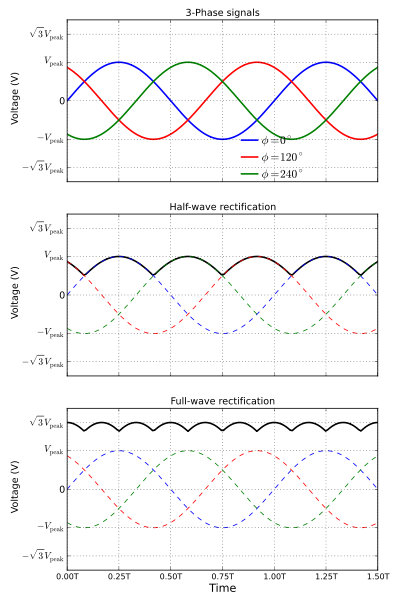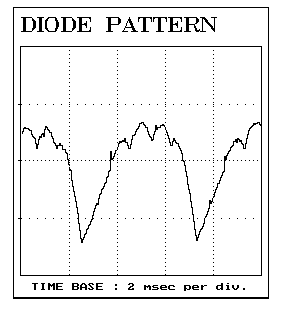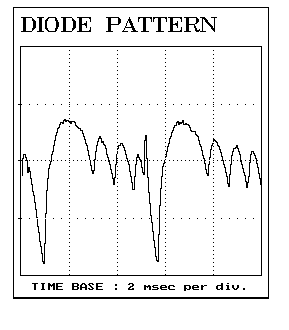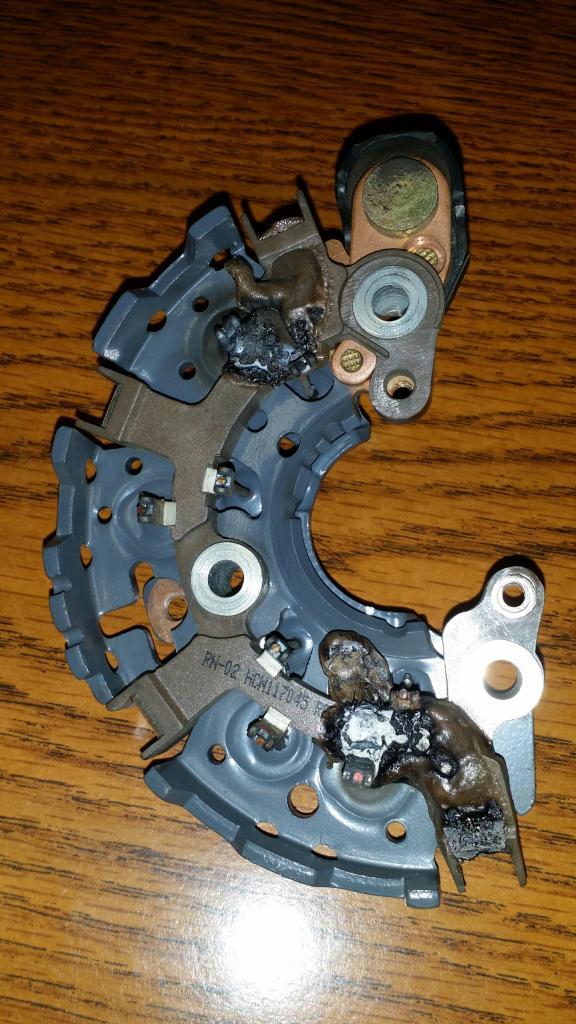Ok Gang...
I've got a for sure way to diagnose torque converter lock up issues where it lock and unlocks at about 45-50 MPH. I had a gent call me yesterday with this problem and he's replace both batteries, alternator and the APPS sensor. Attempted all the different wiring issues (adding ground, tinfoil etc.) nothing worked.
Like I told him the truck ran 11 years without all this stuff and doesn't require any wiring change to make it work. What it needs is the damaged part to be replaced. So he's returned the wiring back to stock setup.
Now I told him to unhook the alternator fuse and take it for a ride... Guess what... No problems! Even though he replaced the alternator it has a damaged diode in it and it bleeding AC noise into the electrical system.
So before doing any wiring mods, tinfoil, adding grounds, adding filter... PLEASE! Bench test your alternator! This is the second time I've suggested this and both time resolved the torque converter lock up issue.
What is bugging me to no end is the fact there is all these wild write up of people adjusting APPS sensors, wiring mods, extra grounds, filters, etc. I still say the truck ran fine without any of these mods for 10-12 years and now it needs it... I doubt highly. I say there is a part that is failed and needs to addressed not band-aided over.
The more and more I kept studying this and the more I ran into people with this issue and what they done never resolves the issue. But now this is the second phone call where I helped a owner with this issue and found that just unhooking the alternator fuse and the problem goes away tests me instantly the alternator is at fault...
Before starting any electrical testing make sure you main battery cables are up to the job and the terminals are clean. You might head over and to my other article and bench test your cables for function. Voltage Drop Testing of Main Feed Cables
Normal output of the alternator is 13.5 to 14.5 volts DC but when flipped over to AC Volts it should never rise above 0.1 volts AC. If it does then you found your AC noise source. Another test is to disconnect the alternator fuse and measure again the battery volts in AC and you notice it drops to zero. This means you found your source of AC noise.
Here is a basic alternator circuit... Take notice there is 6 diodes (3 positive and 3 negative) if I should short out in either side that will be the side the AC waveform leak out on... More diodes fail the worse the problem gets. But in the DC life the gauge will continue to read 14 Volts even though the diodes are bleeding AC wave form.
Failed diode waveforms will create some unusual patterns which will create the torque converter issues you guys are having. Here is a normal alternator output with good diodes.

Here is failed diode patterns...


Why am I going out and trying to fix this problem? Because the AC noise created by the alternator is being fed to all systems ECM, PCM, ABS, etc. So there is a chance that some of the random failures of ECM's and VP44 is caused from a failed alternator.
To fix this issue you will need to replace the Diodes on the alternator. Here is the Mopar1973man kit for this. Please ensure you troubleshoot your alternator fully and ensure the Diodes are to blame. We will not offer a refund once the Diodes have been installed.
Another Member Results
As posted from craneop (AKA: Terry Quirk)
Forum Post
OK! Problem solved! Yippee!!!
Took the recently purchased Alternator back to O'Reilly's where I got it from, had them test it on their tester. They told me they run the test 3 times and if they get a PASS all three times, its a good alternator. When I asked about measuring AC Voltage, they looked dumbfounded, so I asked them if I could hook my multi-meter up to the alternator while they tested? They agreed! So now this alternator is reading .35 Volts AC as the first test PASS'S, they run the second test and we get a FAIL, the guy gives me a funny look, checks his wires and runs the third test and we get another FAIL. So the guy now rells me guess we have a bad alternator but they don't have another one on the shelf and I will need to wait till tomorrow to bring one in from the other store. I say, I'm OK with that, but that I've learned my lesson and we are going to have to test the next alternator as well before I leave the store with it. The next morning (yesterday) they call me and let me know the alternator is in and I can come down and pick it up. We do the test like before, and this time we get a PASS, PASS, PASS, however my multi-meter is reading 0.3 Volts AC, and then I also notice that on their machine there is a box at the top that says Diodes and across from that box on the screen says N/A. So I ask the guy about it and he says their machine has no way of testing the diodes, it only test for overall condition of the alternator. Unhappy with what I'm hearing and looking at, I request my money back which they had no problem with at all, however the core I earlier took in was no longer in the store so the gave me cash in the amount of $215.00 (their core charge on that alternator $36.00 along with the full purchace price of $179.00.)
By this time I have no core, only to find out all the other auto parts stores around town are charging a $70 - $80 core charge for this alterrnator, and a lot of the places have no tester. Starting to get a bit frustrated, I decided to quit messing around and go to the most reliable place in town I know of, a small family owned auto electric and mechanical shop (Auto Electric, Anchorage, Alaska). I was hoping that maybe they had heard of this isuue I am having with the TCL and get fixed up with a good alternator. They rebuild all kinds of auto electrical parts right there in house as well a run a full service auto mechanic shop. Well,,,,I explained my problem to them and showed them a printed copy of the troubleshooting procedure I got from the Mopa1973Man website, to which they said...never heard of this before. However these guys are real pro's and they didn't blow me off. They took my concerns seriously, brought two techs in out of the shop to talk with me about this, as I explainded to them the 0.1 Volt AC upper limit thing. They genuinly got concerned and were pulling down alternators, checking them on the bench and checking outputs at vehicles in the shop. In all, I was in there for about two hours while they tested and discussed and in the end the shop found me a NEW alternator and gave me a heck of a deal @ $239.00 w/no core charge. The NEW alternator was putting out 0.22 Volts AC on their alternator bench vise, and that concerned me cause I was looking for something under 0.1 VAC. However in further discussion, the techs I was working with concluded, (and BTW they turned out to be right), that the test machine itself was putting off AC Noise and that the Fluke Meter was picking up that AC Noise during the test, and that since the Voltage Regulator is on either the PCM or ECM, the only way to accuratly read out the AC output on this alternator was to put it on the vehicle and measure it at that time. So,,,I took the alternator home, hooked it all up, and WALLA... measured at the battries -0.01 Volts AC @idle, and 0.00 Volts AC @2000 RPM. Feeling pretty good at this point I take it for a test drive. Runs and shifts perfectly. NO MORE PROBLEMS!!!
Cory, I believe he's the manger or maybe owner, at Auto Electric said though he's heard and dealt with a lot of Dodge Cummins issues like this before, had never heard of this shifting problem being linked to + 0.10 VAC output on the alternator. He asked me to check back in with him to let him know how all this worked out. I will do that on Monday, as well as express my thanks for all the personal attention, efforts and concerns Auto Electric gave to me to adress my problem.
In the meantime, my utmost gratitude to Mopar1973Man for sharing your knoweledge and wisdom on this issue. I had tried all the bandaid tricks only to have them each work for anywhere to a couple hours to a couple days or so and then reappear. I believe what was happening was that as I fixed a ground or foiled a wire, it masked the problem just long enough for the diodes on the alternator to get a little worse and then BOOM, the problem is back!
Very good information Mopar1973Man!!!
Happy Holidays!!!
Update: November 19, 2014
Here we go with another blown alternator confirming without a doubt of the diodes being a cause.
Before any repair...
After the alternator is rebuilt...
The cause...




